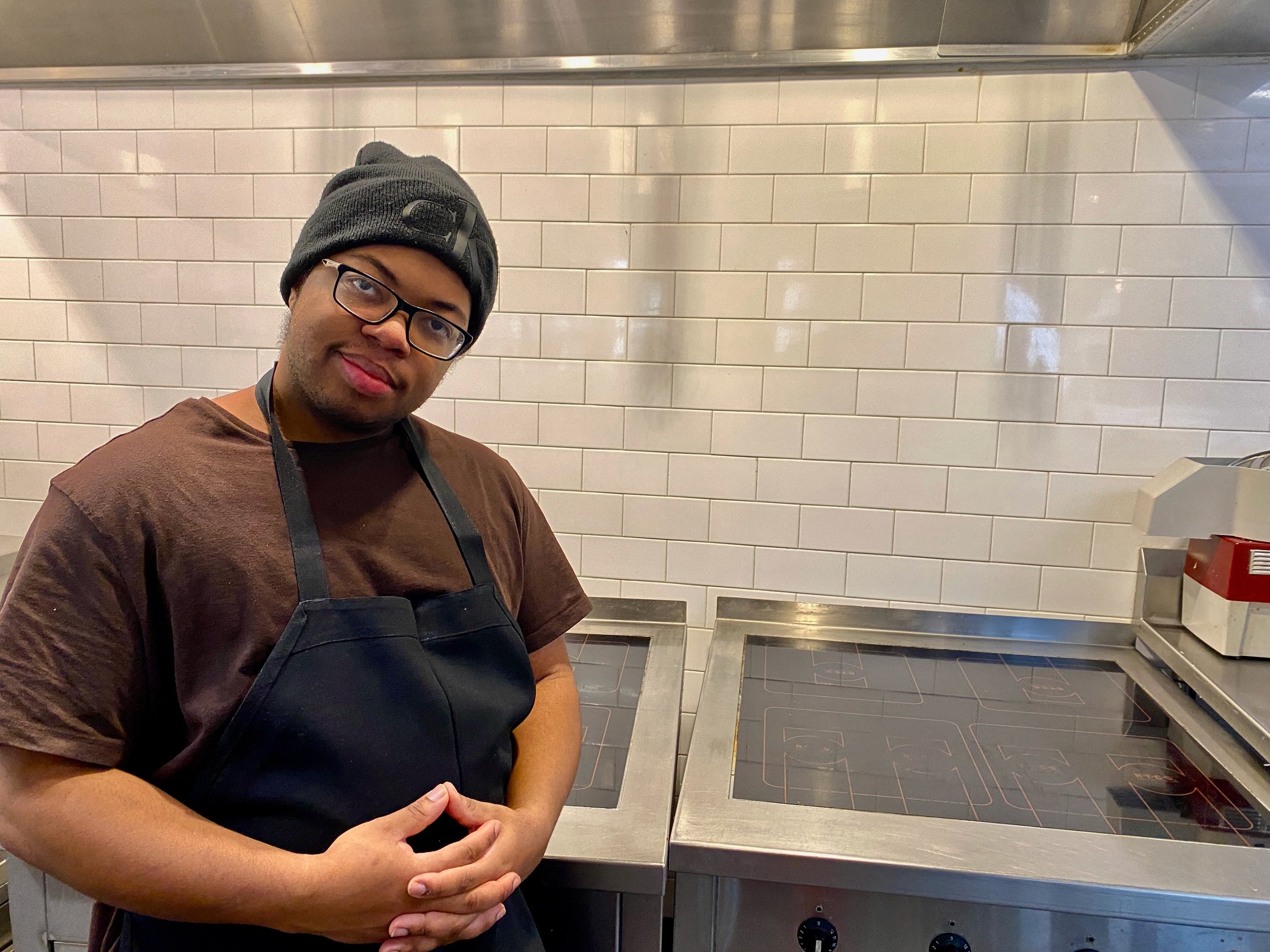Cooking Without Gas: A Look at Induction Cooking at Chatham
Food studies student Tamon Ewell ’25 stands next to two of the induction stovetops in the Esther Barrazone Center. (Mick Stinelli)
When Alice Julier watched Chef Chris Galarza give an induction cooking course to Chatham students at Eden Hall Campus, he took a hot pan from the stove and moments later put his hand on it.
“See?” he said. “Not hot.”
It was a neat trick to show how induction heat works differently than gas stovetops. But what really impressed Julier, a professor of food studies, was how quickly Galarza cooked the food in that workshop: chicken, potatoes, peppers with perfect char—all cooked in mere minutes, using less energy and keeping the air cleaner than a gas stove would.
Induction cooking, once a niche market, has soared in popularity in recent years. It’s easy to use with the right cookware; it’s safer than gas, because it uses magnetic heat; and it’s more efficient, cooking food at a fraction of the time it takes with a gas range.
That’s partly the reason why the induction cooking equipment at Eden Hall Campus has garnered increased interest. The PBS program “NOVA” featured it when they explored the Esther Barazzone Center’s (EBC) dining hall in a 2023 episode called “Chasing Carbon Zero.”
At Eden Hall, students will now have the opportunity to be certified in induction cooking. Many students already become ServSafe Certified, and they may receive other certifications for the work they do on Eden Hall Farm.
Julier, who’s also the director of the Center for Regional Agriculture Food and Transformation (CRAFT) at Chatham, says the induction cooking certification is another way students can differentiate themselves when they enter the job market.
“The ability to cook on that technology, the knowledge of how it works, and the science behind it, that puts them in a different category, as a potential employee, than someone you have to train,” Julier says.
Those jobs could be in institutional food service, food enterprise, food education, and nonprofit work. Julier points to students like Tamon Ewell ’25, who majors in food studies. He works at the EBC as a cook, and he also works as a prep cook at Harvie, a grocery delivery service that works with regional farmers. “With Harvie, they kind of wanted to give me a platform to do what I wanted,” Ewell says. That included a butternut squash pie dip recipe he made.
Businesses stand to benefit from switching to induction cooking too. Robert Sroufe is a professor of sustainability and the Falk chair of socially responsible business at Chatham. He says induction cooking offers benefits for both internal air quality and the pocketbook.
“If we think about how expensive natural gas is and how much of it we waste in our systems, versus how much more efficient it is to convert electricity to a heated pot through induction cooking, we’re much better off” with the latter, he says.
In restaurants, induction cooking helps keep the kitchen cool and, thanks to quick cooking times, can allow the front-of-house staff to turn tables faster. “When you’re working in an environment that’s a low-margin environment to begin with, every second, every minute you can save is critical for the value proposition of that space,” he says.
“Most of us don’t think about this,” Sroufe adds. “We turn on the lights, we’re happy they work, and the systems behind it are kind of an afterthought.” In addition to lower energy bills and better indoor air quality, you don’t have to worry about leaving an induction stovetop on when you leave the house.
And Sroufe predicts you will find induction cooking popping up in more and more homes around the U.S., adding that he recently learned from his mother, who lives in the sweltering state of Arizona, that she has had the equipment for ten years. “Eventually it will be ubiquitous,” he says.
Learn more about Chatham’s food studies program and the sustainability-focused Eden Hall Campus at chatham.edu.

